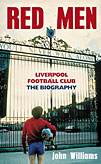 Simon Tyers explores the punditry credentials of one of football’s more controversial players, Robbie Savage:
Simon Tyers explores the punditry credentials of one of football’s more controversial players, Robbie Savage:
Stating that Robbie Savage is a difficult person to admire is like suggesting Jeremy Kyle could be more equitable. Like Kyle, Savage is the sort of personality who could only have risen to the top of his chosen profession at this specific moment. He’s benefited from the disappearance of the traditional hard man, the short-haired, beefy full-back or defensive midfielder whose raison d’être was to see how many reducers a creative winger could stand, the “that type of player” that no player who lunges in two-footed on an opponent’s shin these days apparently is.
Seen off by clampdowns on reckless tackling, the standard bearer for the player who goes in hard and covers a lot of ground is now a bellicose Scrappy Doo who was once fined for using the referee’s lavatory. Where most retired hatchet-men proudly state their lack of regret for their actions, Savage seems continually flummoxed as to what he’s ever done that people might be expecting him to regret.
Somewhere along the line Savage lost the admiration of fans of the team he played for, which was pretty much all that was keeping him afloat for years. But like most players who seem reasonably approachable and have a certain back-page profile, he was compensated by being invited into the media. Like Stan Collymore before him, Savage proceeded to surprise radio listeners with the breadth of his tactical knowledge and so producers swooped to put him on everything. Like Collymore, the wider exposure has only served to expose his limitations.
In essence, these are threefold. One, he’s still professional footballer Robbie Savage. Two, his natural range is the shrill half-shout. Most importantly, he can’t control his overexuberance when miked up. His comments are usually anodyne but they’ll be delivered as if he’s just been told the oxygen is about to be sucked out of the room. If he can fit a joke in on the end, or just an over the top laugh, he’ll consider it a bonus.
Anyone who saw the ESPN coverage of Man City’s home Europa League game against Dynamo Kiev will be well aware of the deadening touch Savage can bring to any moment. Watching the Premier League’s most singular footballer Mario Balotelli struggle with a training bib, Savage progressed in under a minute from confusion to a lame joke – “I think I’m going to change his name to [expectant pause] Mario Bibotelli!” – which not even Ray Stubbs dignified with a reaction. Having gone for the funny far too early, he progressed quickly to an outraged tone rarely heard outside late night phone-ins on Radio 5 Live. “Is this tonight? Is this now? It’s gotta be a wind-up, this,” he thundered, as if some training ground footage had been accidentally slipped in.
Football Focus, a programme which never met an anodyne footballer it didn’t like, has been using Savage as a reporter for a few months. And so it was that he turned up with pitchside tactical analysis at Everton v Birmingham filmed from an unedifying position adjacent to the cameraman crouching down next to him. This piece was introduced by Dan Walker as “keeping an eye on their tactics – no truck required, though”. It’s always fun to grind Andy Townsend’s reputation back into the dirt at any given opportunity, but the Tactics Truck was a three-minute feature that ran for roughly two months nearly ten years ago. Children the length and breadth of the country must have been seeking explanations from their parents.
Savage then turned up as token Welshman outside the Millennium Stadium ahead of England’s visit, in a production that dealt in national cliches to an extent not seen since the last World Cup game involving an African side – Manic Street Preachers music, helicopter shots of unfurling valleys and a cameo by Miss Wales. Savage was first required to interview Gary Speed, whom he greeted with a Yoda-like fragment of a sentence, “Premier League legend – you are!”, where most people would have used a question.
Afterwards he gave his verdict on Wales’s chances, which was that: “We need the keeper to play like Neville Southall, the defence to play like Kevin Ratcliffe and the strikers to score goals.” Why Ian Rush was overlooked was unclear. No wonder Dan Walker and the pundits had been placed against the backdrop of a local brass band and some chanting children. Clearly someone felt that alternate entertainment might be required.
From WSC 291 May 2011


 Twenty years of the Premier League
Twenty years of the Premier League Liverpool Football Club – The Biography
Liverpool Football Club – The Biography